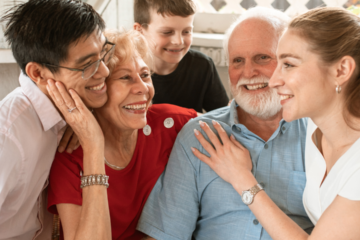Breaking the Cycle: How to Address Violence in the Family

Family violence can be a vicious cycle that seems impossible to break. It affects not only the victims but also the perpetrators and their children, who may grow up repeating the same patterns of behavior.
But breaking this cycle is possible! In this blog post, we’ll explore effective strategies for addressing violence in the family and creating a safer and more peaceful home environment. Whether you’re experiencing abuse yourself or want to support someone who is, these tips will help you take action and make positive changes for yourself and your loved ones. So let’s get started!
Introduction to Family Violence
There are many forms of family violence, including physical, emotional, sexual, and financial abuse. It can happen to anyone, regardless of age, gender, race, or socioeconomic status.
Family violence is often a cycle that is passed down from one generation to the next. Children who witness or experience violence in the home are more likely to perpetuate it in their own relationships as adults.
Breaking the cycle of family violence is essential for the safety and well-being of all members of the family. It takes collective effort and commitment from everyone involved.
If you are experiencing violence in your home, please reach out for help. There are many resources available to support you and keep you safe.
Causes and Symptoms of Family Violence
There are many causes of family violence, but most often it is the result of a power imbalance in which one family member feels they have control over another. It can be caused by a variety of factors, including abuse of alcohol or drugs, mental illness, poverty, and social isolation.
Symptoms of family violence can vary depending on the type of abuse that is taking place. Physical abuse may include injuries such as bruises, cuts, or broken bones. Sexual abuse can involve forced or unwanted sexual contact. Emotional abuse may involve threats, name-calling, or putting another person down.
If you suspect that family violence is occurring in your home, it is important to reach out for help. There are many resources available to assist you, including hotlines, counseling services, and support groups. You do not have to suffer in silence; there is help available.
Impact of Family Violence on Children
In order to break the cycle of violence in families, it is essential to understand the impact that family violence has on children. Children who witness or are victims of family violence can suffer a range of short- and long-term effects. These effects can include physical injuries, emotional trauma, and behavioral problems.
Physical injuries are a common result of family violence. Children can sustain severe facial injuries, including concussions or the loss of teeth due to the impact. In such cases, it may be necessary to promptly seek the assistance of an Emergency Dentist Sunnyvale or elsewhere. They might also get kicked, punched, and get their bones fractured, which may require immediate medical assistance. In addition to the immediate pain and suffering caused by these injuries, children may also experience long-term health problems as a result of the abuse.
Emotional trauma is another common effect of family violence. Children who witness or are victims of family violence can suffer from anxiety, depression, post-traumatic stress disorder (PTSD), and other mental health issues. These conditions can have a profound impact on children’s ability to function in school and in social situations.
Behavioral problems are also common among children who witness or are victims of family violence. These children may act out aggressively, exhibit withdrawn or regressive behavior, have difficulty concentrating or paying attention, or engage in other disruptive behaviors. Behavioral problems can often lead to academic difficulties and social isolation.
Recognizing the lasting consequences of domestic violence not only on one’s physical health but also on that of their children underscores the importance of seeking legal support. Consulting with a domestic violence attorney becomes crucial for navigating legal avenues to ensure the safety and well-being of both the individual and their children.
A domestic violence attorney can offer guidance on obtaining restraining orders, exploring legal remedies, and initiating proceedings to break free from the pervasive cycle of violence. This legal intervention becomes a vital step toward creating a secure environment for individuals and their children, fostering an opportunity for healing and a violence-free future.
Signs of Child Abuse
There are many signs of child abuse, and they vary depending on the child’s age. Infants may have bruises or welts on their head, face, neck, trunk, legs, or feet. They may also have burns on their hands, mouth, or skin. Older children may have bruises in various stages of healing. They may also have broken bones or burns.
In addition, older children may be sexually abused. This can manifest as STDs, pregnancy, or abnormal genitalia. Sexual abuse can also cause behavioral problems, such as acting out sexually with younger children or being overly sexualized in general. If you suspect your child is being abused, it is important to get them help immediately.
Strategies for Breaking the Cycle of Family Violence
If you’re stuck in a cycle of family violence, it can feel like there’s no way out. But there are strategies you can use to break the cycle and create a safer, healthier home environment for yourself and your loved ones.
First, it’s important to understand how violence begets violence. According to the National Institute of Justice, “the single best predictor of whether a person will become a perpetrator or victim of violence is whether he or she witnessed or experienced violence as a child.” This means that if you were raised in a home where violence was present, you’re more likely to either perpetrate or be the victim of violence as an adult.
But this doesn’t have to be the case. You can break the cycle of family violence by learning new coping and conflict-resolution skills. If you’re the one perpetrating violence, seek professional help to address any underlying anger issues. And if you’re the one being victimized, reach out to a support group or counselor who can help you develop a safety plan.
It’s also important to create an environment in which everyone feels safe expressing their feelings without fear of retribution. This means no name-calling, belittling, or put-downs; instead, encourage open communication in which everyone’s needs are respected.
However, you ought to understand the pattern of violence being committed and recognize if it is a repeated cycle of abuse followed by forgiveness. That said, there may be instances when counselling does not make the cut, where the violence erupts again post-resolution. Cases of such nature are sometimes, beyond repair, which necessitate action. To break away from this vicious cycle, you might need to consider the alternative of divorce, which you can learn about here at Peters May: Expert family solicitors in Mayfair. Legal separation can be a rather elaborate and expensive process. So, you’d want to find yourself the right resources to take on the responsibility in a systematic manner.
Prevention Tips for Parents
As a parent, you have the ability to prevent violence in your family. Here are some tips:
- Teach your children about nonviolent conflict resolution. This can help them avoid using violence to solve problems.
- Model nonviolent behavior yourself. Children learn by watching and imitating those around them.
- Encourage open communication in your family. Create an environment where everyone feels comfortable expressing their thoughts and feelings without fear of retribution.
- Monitor your child’s media consumption. Make sure they are not exposed to excessive violence in TV, movies, video games, etc.
- Seek professional help if you see signs that your child is exhibiting violent behavior or if there is violence in your home. Getting help early can prevent the situation from escalating into something more serious.
Professional Help for Families Affected by Violence
If your family has been affected by violence, you are not alone. There are many professional organizations that can help you and your family deal with the aftermath of violence. Here are some organizations that can help:
- The National Domestic Violence Hotline provides crisis counseling and 24/7 support for victims of domestic violence.
- RAINN (Rape, Abuse & Incest National Network) is the largest anti-sexual violence organization in the United States. RAINN operates the National Sexual Assault Hotline, which provides 24/7 crisis counseling and support for victims of sexual assault.
- The National Parent Helpline is a free, confidential helpline for parents and caregivers who need help managing their child’s behavior or their own stress.
- The Family Violence Prevention Fund works to prevent violence within the home and build healthy families. They offer a variety of resources, including a 24/7 national domestic violence hotline.
Violence in the family is a serious issue that needs to be addressed. By taking steps to educate yourself and your family about violence, you can create an environment where violence is not tolerated.
It will take time, but with patience and commitment, breaking the cycle of violence in families is possible. With the right resources and support, we can help make our homes safe places for all members of the family.



0 Comments